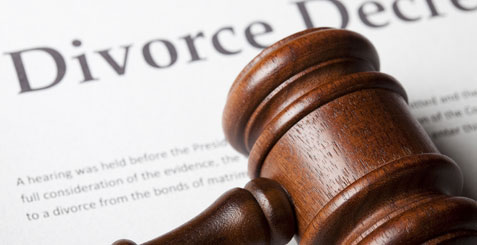Divorce

How does the Church view divorce?
The Church believes that God, the author of marriage, established it as a permanent union. When two people marry, they form an unbreakable bond. Jesus himself taught that marriage is permanent (Matthew 19:3-6), and St. Paul reinforced this teaching (see 1 Cor 7:10-11 and Eph 5:31-32). The Church does not recognize a civil divorce because the State cannot dissolve what is indissoluble. See Catechism of the Catholic Church, #2382-2386.
Are divorced people excommunicated from the Catholic Church?
No. Divorced people are full members of the Church and are encouraged to participate in its activities.
May a divorced Catholic receive Holy Communion?
Yes. Divorced Catholics in good standing with the Church, who have not remarried or who have remarried following an annulment, may receive the sacraments. Catholics who have civilly divorced are encouraged to speak with their parish priest or a spiritual director about their particular situation regarding reception of Holy Communion. Please see the Catechism of the Catholic Church, nos. 2382-2386, for more information.
What support does the Church offer to divorced persons?
The Church understands the pain of those caught in this situation. When divorce is the only possible recourse, the Church offers her support to those involved and encourages them to remain close to the Lord through frequent reception of the Sacraments, especially the Holy Eucharist. (United States Catholic Catechism for Adults, p. 287). Many dioceses offer programs and support groups for divorced and separated persons. Catholic Divorce Ministry, The Beginning Experience, and Journey of Hope are helpful resources.
I am a divorced Catholic who would like to remarry in the Catholic Church. What do I need to do?
Unless your former spouse has died, you will need to obtain an annulment.
I am divorced. I am not a Catholic but I plan to marry a Catholic. We have been told that I need to obtain an annulment before we can marry in the Catholic Church. I do not understand this since I was not married in the Catholic Church.
The Catholic Church respects all marriages and presumes that they are valid. Thus, for example, it considers the marriages of two Protestant, Jewish, or even nonbelieving persons to be binding. Any question of dissolution must come before a Church court (tribunal). This teaching may be difficult to understand, especially if you come from a faith tradition that accepts divorce and remarriage. Some couples in a situation similar to yours have found it helpful to talk with a priest or deacon. To go through the annulment process can be a sign of great love for your intended spouse.
Related resources:
Divorce and Beyond, a book offering a ten-session program to guide people through the grieving process of a divorce. Appropriate for individuals or for divorce support groups, helps start the healing process through study, reflection, and discussion. Also available in Spanish.
Surviving Divorce – Hope and Healing for the Catholic Family, a 12 DVD series with guide either for personal use or as a parish program. Includes Catholic authors Rose Sweet, Dr. Ray Guarendi, Christopher West, and Fr. Mitch Pacwa. Available through Ascension Press.
For Further Reading:
- Healing After Divorce: Hope for Catholics by Susan Rowland
- The Gift of Self: A Spiritual Companion for Separated and Divorced Faithful to the Sacrament of Marriage by Maria Pia Campanella




